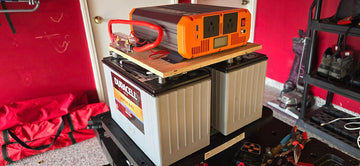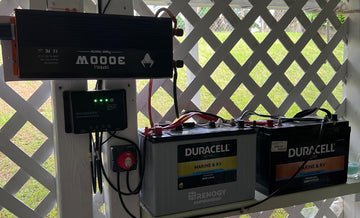Solar charge controllers, located between the solar panel and the battery, are critical components of a solar system. They adjust the charge rate based on the battery's charge level, bringing the charge closer to the battery's maximum capacity and preventing the battery from being overcharged and damaged. There are two common types of solar charge controllers: PWM and MPPT
PWM Controller Working Principle

The core of a PWM (Pulse-width modulation) solar charge controller works like a fast on/off switch. It continuously monitors the battery voltage and adjusts the charging current of the solar panel accordingly as needed. Pulse-width modulation relies on the use of digital switches (transistors) to control the timing of the current flow. The longer the "on time" means more power passes through. If the switch is off, no current passes.
When the battery voltage reaches a certain level, the controller closes the connection to prevent overcharging. Conversely, when the battery voltage drops, the controller re-opens the connection. By quickly switching the connection state between the solar panel and the battery, the PWM controller can maintain a stable output voltage
Pros of PWM Charge Controllers
Affordable
PWM technology is simple and powerful, and it costs less!
Simple operation
PWM controllers typically have a simple operator interface that is easy to install and set up. The fewer components, the less likely the panel will fail.
Suitable for smaller systems
e.g. charging of small solar arrays and low-power devices such as home lighting systems, RVs, boats, cabins, etc. They typically have low power losses and are suitable for application scenarios where energy conversion efficiency requirements are less stringent.
Reliability
PWM controllers are a mature technology, reliable and stable in operation. After years of development and improvement, it has been widely used in solar energy systems.
Cons of PWM Solar Charge Controllers
Lower energy conversion efficiency
Compared to MPPT controllers, PWM controllers have lower energy conversion efficiency. During the charging process, the PWM controller maintains the charging voltage by periodically switching the charging current, which may result in some energy loss.
MPPT Controller Working Principle

MPPT (Maximum Power Point Tracking) controller uses complex algorithms to constantly track the maximum power point (optimum point) of the solar panel to keep it near the maximum power point. It will adjust the charging voltage and charging current to ensure that the solar panel works optimally to extract the maximum amount of energy from the sun. This allows for higher charging efficiency and greater energy harvesting, especially if there are large variations in light intensity or voltage differences between solar panels and batteries. This means that you can extract as much energy as possible from the solar panel, regardless of the intensity of the sun.
Pros of MPPT Charge Controllers
Higher efficiency
MPPT controllers monitor the input voltage to the solar array and the required battery voltage. They then pass the input power through a transformer and convert it to low-voltage, high-current electricity at a level best suited to the charging needs of the batteries.MPPTs convert more solar energy into usable electricity, resulting in more efficient charging and increased energy harvesting.
Flexible panel configuration
MPPT controllers offer flexible panel configurations. They can support higher voltage panels as well as multiple panels in series or parallel configurations. This flexibility allows solar systems to be designed with the optimal panel arrangement to meet specific power requirements.
For large systems
MPPT charge controllers offer system scalability. As energy demand grows, they can accommodate more solar panels or battery banks. High current and voltage ratings make them ideal for maximizing the power of larger arrays.
Adaptability
Maximum power point tracking requires an algorithm that allows the controller to calculate all the data needed for efficient operation, regardless of the amount of power generated.
The amount of power a solar panel can produce depends on the following factors:
- Solar radiation - the amount of light energy that hits the solar panel
- Roof orientation - solar panels are most efficient when in direct sunlight
- Temperature - both high and low temperatures reduce the efficiency of solar panels
- Other factors - weather conditions, shading, type of solar panel, type of roof, and the condition of the solar panels all affect efficiency
The ability to adapt to changing conditions to optimize charging is what makes MPPT charge controllers so effective. This high efficiency allows the MPPT to continue charging the battery even when conditions are less than ideal. More power production means you can pay back your investment costs faster, especially if you have a grid-connected system.
Cons of MPPT Solar Charge Controllers
Higher cost
Compared to PWM solar charge controllers, MPPT controllers are much more expensive. This is because MPPT controllers require more complex electronic circuits and algorithms to realize the maximum power point tracking function. The initial investment can be high and may be a consideration, especially in small or low-budget solar systems.
Complexity
MPPT controllers are relatively complex in design and operation, and the technology used requires additional components, which makes them more prone to failure. MPPT charge controllers typically have a shorter lifespan than PWM models. Some low-quality or unreliable controllers may have stability and reliability issues. This may include erratic power tracking, frequent failures, or inaccurate measurements. Therefore, when choosing an MPPT controller, select a reliable brand and product and check user and expert reviews.
Voltage Range
Because MPPT charge controllers operate above battery voltage, sizing them for your system can be a challenge. They require precise calculations to obtain the proper voltage and current ratings and may require special components to handle the high voltages involved.
Why Choose PWM Over MPPT
Many people may wonder why they would choose a PWM controller over an MPPT controller. However, in some cases, PWM charge controllers may be preferred. Some factors reduce the advantages of MPPT controllers in certain specific scenarios. The most obvious consideration is cost; MPPT controllers tend to cost more than PWM controllers. When deciding which controller to use, the additional cost of MPPT should be analyzed in light of the following factors:
- Low-power system charging applications use PWM controllers, which provide equal or better energy harvesting. If there is only a small solar panel array and a battery, the PWM controller will provide sufficient charge control without the advanced features of an MPPT controller. When used in low-power applications, the collection efficiency of the MPPT regulator is typically significantly lower (relative to its peak efficiency)
- The array power output of the solar system is significantly greater than the system load power consumption, resulting in the batteries being fully charged or nearly fully charged most of the time, then the system may not benefit from the enhanced capabilities of the MPPT regulator. Since the batteries are already full, the excess solar energy cannot be stored efficiently and is wasted. In this case, it may be more appropriate to use a PWM charge controller. The PWM controller can directly match the output power of the solar panel to the load power, enabling simple charging control without the need for complex power point tracking algorithms.
- In colder climates, the MPPT regulator can better track the maximum power point of the solar panel, thus providing higher energy conversion efficiency. If the average ambient temperature at the site is so high that it causes the Vmp of the solar panel to drop close to the system battery voltage, the MPPT regulator may not be able to derive significant benefits from temperature compensation and maximum power point tracking. It may be more economical and practical to select a PWM regulator for this condition.
Detailed Comparison Table: PWM vs MPPT
| PWM Conroller | MPPT Controller |
| Lower price | Higher price |
| eficiency at 75-80 % | efficiency at 90-99% |
| Best suited for standard panels with lower voltages (e.g. 12V) | Suitable for a wider range of panel voltages and types |
| PV array and cell voltages should match | PV array voltage may be higher than battery voltage |
| Operates at battery voltage, so performs well in warm temperatures and when battery is almost fully charged | Runs above battery voltage, so can provide a "boost" in cold temperatures and when the battery is low |
| Ideal for smaller systems | Ideal for larger systems (e.g. 300W+) |
| RVs, boats, cabins and other small installations with steady sunlight | Large residential or commercial solar systems, off-grid installations, and areas with variable weather conditions |
Conclutions:
PWM and MPPT solar charge controllers are two distinct types with different operating principles and performance characteristics. According to your specific situation, choose the right controller for you!

















